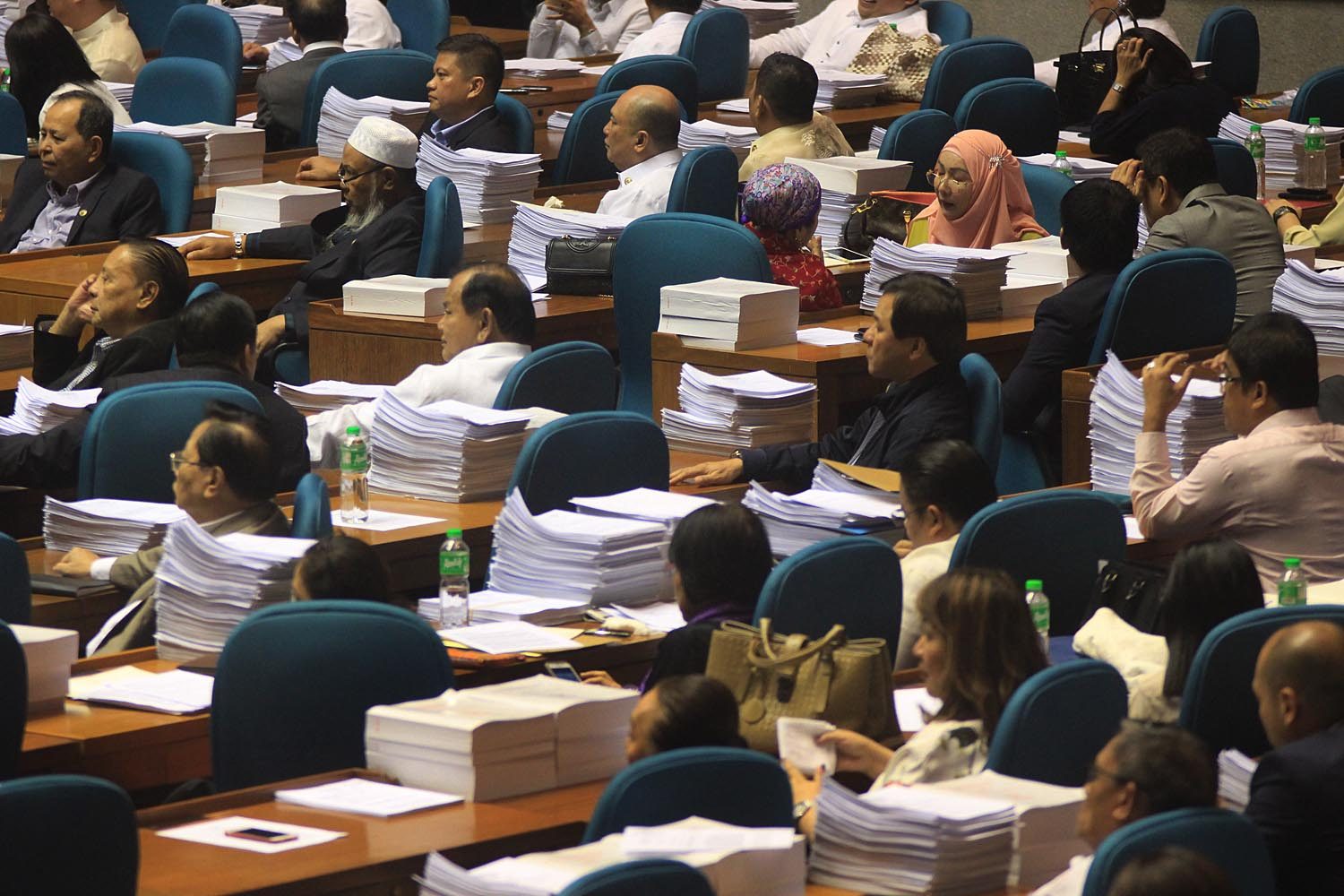SUMMARY
This is AI generated summarization, which may have errors. For context, always refer to the full article.


MANILA, Philippines (UPDATED) – The second batch of tax reforms being proposed by the administration of President Rodrigo Duterte hurdled the House of Representatives.
Lawmakers voted 187-14-3 to approve House Bill (HB) No. 8083 or the Tax Reform for Attracting Better and Higher Quality Opportunities (Trabaho) bill on 3rd and final reading on Monday, September 10.
Legislators gave their final nod to the bill just 6 days after they approved it on 2nd reading on September 4.
What are the main provisions? The Trabaho bill aims to gradually cut corporate income taxes starting 2021, eventually bringing down the current 30% to 20% by 2029. (READ: EXPLAINER: Why the government is pushing for 2nd TRAIN package)
The measure also seeks to rationalize fiscal incentives or remove certain perks. The Trabaho bill retains the current incentives for two years, for investors to have enough time to adjust to the new tax scheme. Perks will now also be targeted, time-bound, and transparent.
The Department of Finance estimated that the government lost some P178 billion in potential revenue in 2016 due to redundant tax incentives.
But what’s the catch? Bayan Muna Representative Carlos Zarate and Gabriela Women’s Party Representative Arlene Brosas, who both opposed the bill, said it would only add to the burdens felt by Filipinos because of the Tax Reform for Acceleration and Inclusion (TRAIN) law.
The TRAIN law, which is the Duterte government’s first tax reform package, reduced personal income taxes but increased taxes on cars, tobacco, sugar-sweetened beverages, and fuel.
“Ngayon ay nais nating bawasan ang corporate income tax mula sa kita sa panghuhuthot ng TRAIN 1 sa ordinaryong mamamayan. Nasaan ang ‘progressive taxation’ rito? Ang totoo, ang TRAIN Package 1 at 2, pati na ang iba pang pahabol na TRAIN 1B, ay mga panukalang nais lamang pigain pa ang mamamayan, at maligtas sa pagbabayad ng buwis ang mayayaman,” said Zarate.
(Now, we want to reduce corporate income tax, coming from the extortion brought by TRAIN 1 to ordinary citizens. Where is “progressive taxation” there? The truth is, TRAIN Package 1 and 2 as well as the supplemental TRAIN 1B are measures that would squeeze ordinary citizens dry while saving the rich from paying taxes.)
Brosas also said HB 8083’s name is deceptive, as it would not provide more jobs.
“Napakalaking panlilinlang na ipaketeng Trabaho bill itong TRAIN 2 dahil ang totoo’y sasagasa pa nga ito sa libo-libong trabaho. Popondohan nito sa esensya ang pagtanggal sa mga manggagawa sa porma ng cash grants at skills training,” said Brosas.
(The Trabaho bill is a big deception because it would affect thousands of jobs. It would essentially fund the removal of workers through cash grants and skills training.)
Who opposed or abstained from voting? Aside from Brosas and Zarate, the other 12 lawmakers who voted against the Trabaho bill are:
- Gary Alejano, Magdalo
- Lito Atienza, Buhay
- Bolet Banal, Quezon City 3rd District
- Jose Christopher Belmonte, Quezon City 6th District
- Gabriel Bordado, Camarines Sur 3rd District
- Ariel Casilao, Anakpawis
- France Castro, ACT Teachers
- Raul Daza, Northern Samar 1st District
- Sarah Elago, Kabataan
- Edcel Lagman, Albay 1st District
- Miro Quimbo, Marikina 2nd District
- Tom Villarin, Akbayan
The following abstained from voting:
- Teddy Baguilat Jr, Ifugao
- Arnulfo Teves, Negros Oriental 3rd District
- Manuel Zubiri, Bukidnon 3rd District
The Philippine Ecozones Association previously warned that the second batch of tax reforms would have a negative impact on foreign direct investments in economic zones across the country.
This would mean job losses, lower production output and exports, capital flight, and other setbacks that would offset the gains in ecozones.
But Finance Undersecretary Karl Kendrick Chua said job losses would only be “very minimal.” He said that while some jobs may be cut from some sectors, employment in other sectors would experience growth due to lower corporate income taxes.
The Trabaho bill must successfully go through another 3 readings at the Senate before it can be transmitted to President Rodrigo Duterte for his signature.
Read a full copy of the Trabaho bill below:
– Rappler.com
Add a comment
How does this make you feel?
There are no comments yet. Add your comment to start the conversation.